中考英语知识点复习 专题十四:简单句
初中英语“简单句”专题讲解

初中英语“简单句”专题讲解(一)基本概念只包含一个主语(或并列主语)和一个谓语(或并列谓语)的句子,称作简单句。
在简单句中主语和谓语是句子的主干,是句子的核心。
除了主语和谓语外,简单句中还可以有宾语、表语、补语、状语、定语等。
(二)句型结构简单句可归纳为五个基本句型。
1.主语+谓语这种句型简称为主谓结构,其谓语一般都是不及物动词,后面可以有其他成分修饰。
如:T h i n g s c h a n g e.H e s m i l e s h a p p i l y.2.主语+连系动词+表语这种句型称为主系表结构。
如:M r.S m i t h i s a n a r t i s t.T h e h a m b u r g e r t a s t e s g o o d.注:表语位于系动词之后。
常由名词、形容词、副词、介词短语、不定式、动词的-i n g、从句来充当。
常见系动词有:(1)表状态系动词---b e如:H e i s a t e a c h e r.H e i s i l l.(2)持续系动词--用来表示主语继续或保持一种状况或态度,常见有k e e p,r e m a i n,s t a y,如:H e a l w a y s k e p t s i l e n t。
(3)表像系动词--用来表示"看起来像"这一概念,主要有s e e m, a p p e a r,l o o k,如:H e l o o k s t i r e d.H e s e e m s(t o b e)v e r y s a d.(4)感官系动词---感官系动词主要有f e e l,s m e l l,s o u n d, t a s t e,如:T h i s k i n d o f c l o t h f e e l s v e r y s o f t.。
(完整word)中考英语专项练习之简单句
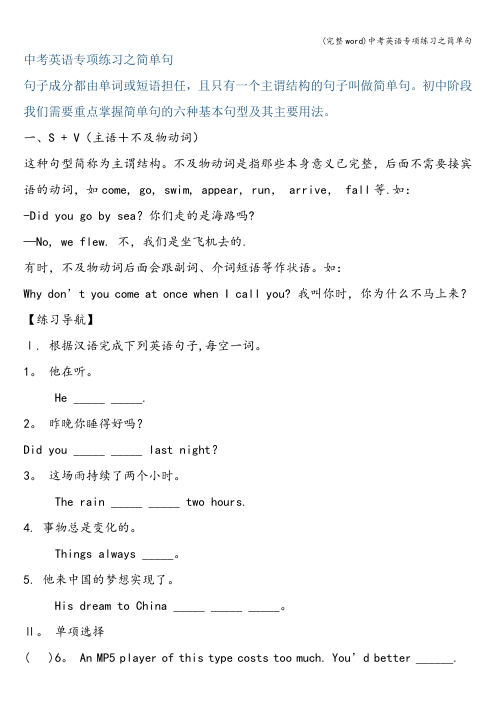
中考英语专项练习之简单句句子成分都由单词或短语担任,且只有一个主谓结构的句子叫做简单句。
初中阶段我们需要重点掌握简单句的六种基本句型及其主要用法。
一、S + V(主语+不及物动词)这种句型简称为主谓结构。
不及物动词是指那些本身意义已完整,后面不需要接宾语的动词,如come, go, swim, appear, run, arrive, fall等.如:-Did you go by sea?你们走的是海路吗?—No, we flew. 不,我们是坐飞机去的.有时,不及物动词后面会跟副词、介词短语等作状语。
如:Why don’t you come at once when I call you? 我叫你时,你为什么不马上来?【练习导航】Ⅰ. 根据汉语完成下列英语句子,每空一词。
1。
他在听。
He _____ _____.2。
昨晚你睡得好吗?Did you _____ _____ last night?3。
这场雨持续了两个小时。
The rain _____ _____ two hours.4. 事物总是变化的。
Things always _____。
5. 他来中国的梦想实现了。
His dream to China _____ _____ _____。
Ⅱ。
单项选择A. waitB. waitingC. waited D。
to wait( )7。
It _____ outside。
I have to stay at home.A. rainB. is raining C。
rained D。
has rained ( )8。
-Did you watch the basketball match yesterday?—Yes, I did. My uncle ______ in the match。
A. is playingB. was playingC. has playedD. will play ( )9. —What did your father say just now?-Sorry, I don’t know。
中考英语之重点语法复习——简单句
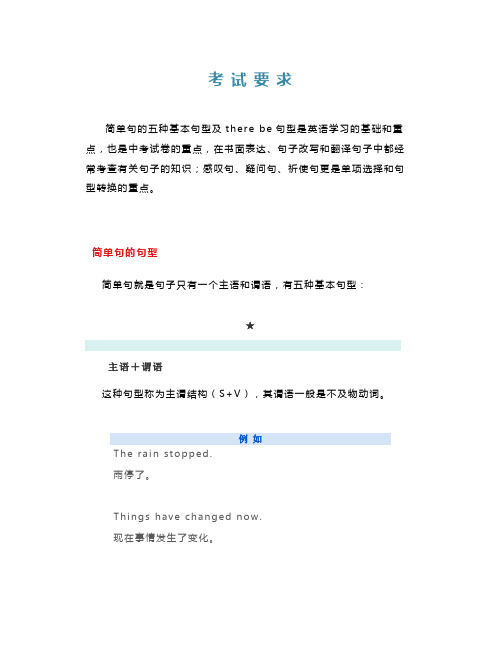
考试要求简单句的五种基本句型及t h er e b e句型是英语学习的基础和重点,也是中考试卷的重点,在书面表达、句子改写和翻译句子中都经常考查有关句子的知识;感叹句、疑问句、祈使句更是单项选择和句型转换的重点。
简单句的句型简单句就是句子只有一个主语和谓语,有五种基本句型:★主语+谓语这种句型称为主谓结构(S+V),其谓语一般是不及物动词。
例如T h e r a i n st o p pe d.雨停了。
T h i n g s h a v e c h a n g e d n o w.现在事情发生了变化。
★主语+连系动词+表语这种句型称为主系表结构(S+L+P),连系动词在形式上也是一种谓语动词,表语一般是名词或者形容词。
例如H i s f a t h er i s a t ea c h e r.(表语是名词)他的爸爸是老师。
Y o u r m o t h er i s v e r y y o u n g.(表语是形容词)你的妈妈很年轻。
★主语+谓语+宾语这种句型称为主谓宾结构(S+V+O),其谓语动词是及物动词或者不及物动词加介词,宾语是直接宾语。
例如T h ey o f t e n s p e a k E n gl i s h a t t h e m e e t i n g.他们在会上经常说英语。
S h e i s w o r r y i n g a b o u t h e r so n.她正在担心她的儿子。
★主语+谓语+间接宾语+直接宾语这种句型称为主谓宾宾结构(S+V+D O+I O),其谓语动词必须是可以跟双宾语的及物动词,两个宾语中表示事物的是直接宾语,另一个表示人的是间接宾语(此结构可以用介词进行转换)。
例如M y f a t h er ga v e m e a p e n l a s t n i gh t.=M y f a t h er g a v e a p en t o m e l a st n i g h t.昨天晚上我爸爸给我一支钢笔。
专题14 简单句(陈述句 感叹句 疑问句 祈使句)
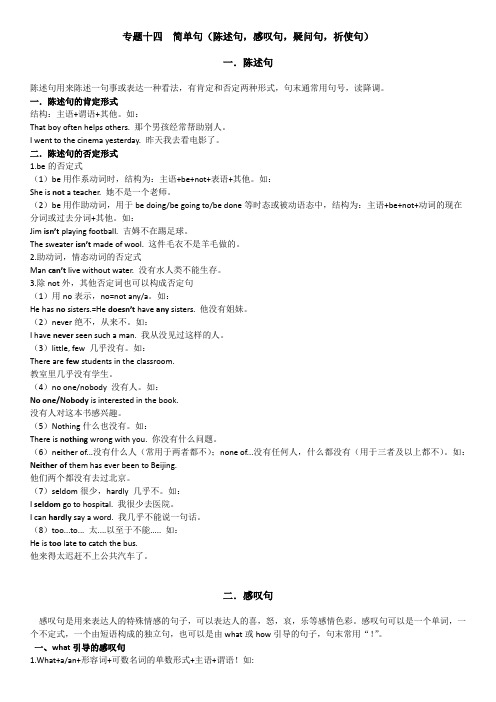
专题十四简单句(陈述句,感叹句,疑问句,祈使句)一.陈述句陈述句用来陈述一句事或表达一种看法,有肯定和否定两种形式,句末通常用句号,读降调。
一.陈述句的肯定形式结构:主语+谓语+其他。
如:That boy often helps others. 那个男孩经常帮助别人。
I went to the cinema yesterday. 昨天我去看电影了。
二.陈述句的否定形式1.be的否定式(1)be用作系动词时,结构为:主语+be+not+表语+其他。
如:She is not a teacher. 她不是一个老师。
(2)be用作助动词,用于be doing/be going to/be done等时态或被动语态中,结构为:主语+be+not+动词的现在分词或过去分词+其他。
如:Jim isn’t playing football. 吉姆不在踢足球。
The sweater isn’t made of wool. 这件毛衣不是羊毛做的。
2.助动词,情态动词的否定式Man can’t live without water. 没有水人类不能生存。
3.除not外,其他否定词也可以构成否定句(1)用no表示,no=not any/a。
如:He has no sisters.=He doesn’t have any sisters. 他没有姐妹。
(2)never绝不,从来不。
如:I have never seen such a man. 我从没见过这样的人。
(3)little, few 几乎没有。
如:There are few students in the classroom.教室里几乎没有学生。
(4)no one/nobody 没有人。
如:No one/Nobody is interested in the book.没有人对这本书感兴趣。
(5)Nothing什么也没有。
如:There is nothing wrong with you. 你没有什么问题。
中考英语复习之专项:简单句 (教师版)
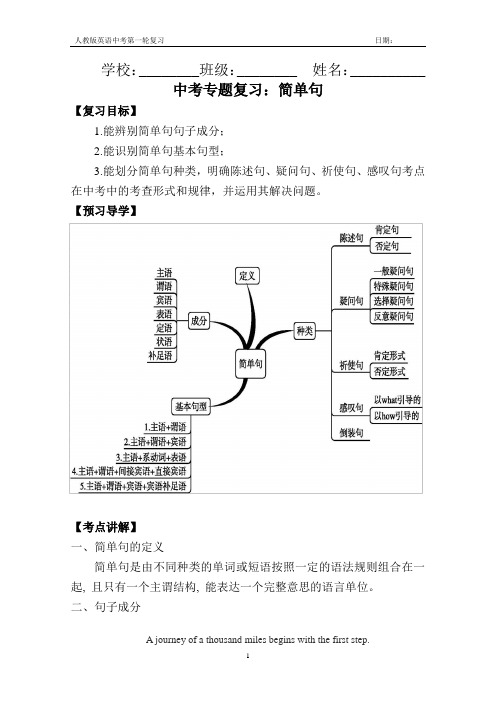
学校:________班级:________ 姓名:__________中考专题复习:简单句【复习目标】1.能辨别简单句句子成分;2.能识别简单句基本句型;3.能划分简单句种类,明确陈述句、疑问句、祈使句、感叹句考点在中考中的考查形式和规律,并运用其解决问题。
【预习导学】【考点讲解】一、简单句的定义简单句是由不同种类的单词或短语按照一定的语法规则组合在一起, 且只有一个主谓结构, 能表达一个完整意思的语言单位。
二、句子成分组成句子的各个部分即是句子成分。
句子成分主要有七种, 分别是主语、谓语、表语、宾语、定语、状语、补足语。
主语和谓语是句子的主体。
三、简单句的基本句型句子按照其结构可分为简单句、并列句和复合句。
其中简单句又可分为五大基本句型。
在英语中的各类复杂句子也都是由这五种基本句型扩展而成的。
(一)主语+谓语这种句型简称为主谓结构, 其谓语一般都是不及物动词。
The boy laughed at last. 最后这个男孩笑了。
主语谓语注意:(1)动词是不及物动词, 后面不能跟宾语, 也无被动语态。
(2)很多情况下, 不及物动词由副词或别的状语修饰, 有的动词如果不加状语修饰, 句意可能不完整。
She lived. →She lived in that country. 她住在那个国家。
(二)主语+谓语+宾语这种句型可称为主谓宾结构, 它的谓语一般多是及物动词或相当于及物动词的动词词组。
They will visit the Bird’s Nest this weekend.主语谓语宾语他们这个周末要去参观鸟巢。
注意:如果动词词组是“动词+副词”型, 而宾语又是代词时, 只能将宾语置于动词和副词之间; 若宾语是名词, 则在副词前后均可。
(三)主语+系动词+表语这种句型称为主系表结构, 连系动词在形式上也是一种谓语动词。
规律总结连系动词有三类:①表示状态的连系动词有: be, seem, stay, keep等; ②表示感官的连系动词有: look, sound, smell, feel, taste等; ③表示变化的连系动词有: get, go, become, turn, grow等。
初中英语语法总结(简单句)

初中英语语法总结一、简单句1、简单句的特点:简单句通常只由一个主语(或并列主语)和一个谓语(或并列谓语)构成。
2、简单句的种类:简单句一般分为陈述句、疑问句、感叹句和祈使句四种。
3、陈述句:用来说明一个事实的句子叫陈述句。
它有肯定式和否定式两种形式。
▲陈述句的肯定式:He is a middle school student.(他是个中学生)/ I have a hammer in my hand.(我手上有把锤子)/ She teaches us geography.(她教我们地理)/ The new play was good enough and everybody enjoyed it.(新的话剧非常好大家都喜欢)▲陈述句的否定式:1)谓语动词如果是to be 、助动词、情态动词时,在它们的后面加“not”。
如:My brotheris not a teacher.(我的弟弟不是教师)/ He does not have a cousin.(他没有堂兄弟)/ I will not go there tomorrow.(明天我不去那儿)/ My mother is not cooking a meal inthe kitchen.(我母亲现在不在厨房里做饭)/ You must not make such mistakes again.(你不该再犯类似错误了)/ We haven’t discussed the question yet(我们还没有讨论那个问题呢).2)谓语动词如果没有上述词语而是其他动词时,须在它的前面加do not(don’t).如:Idon’t know anything about it.(此事我一无所知) / Li Ming does not feed pigs in thecountryside.(李明不在农村养猪)/ We didn’t expect to meet her right here.(我们没指望着在这里见到她)/ We didn’t have a meeting yesterday afternoon.(昨天下午我们没有开会)3)如果“have”作“有”讲,也可以在它后面加not构成否定式,其形式与have got的否定式相同。
中考英语语法专项复习:简单句、并列句和复合句
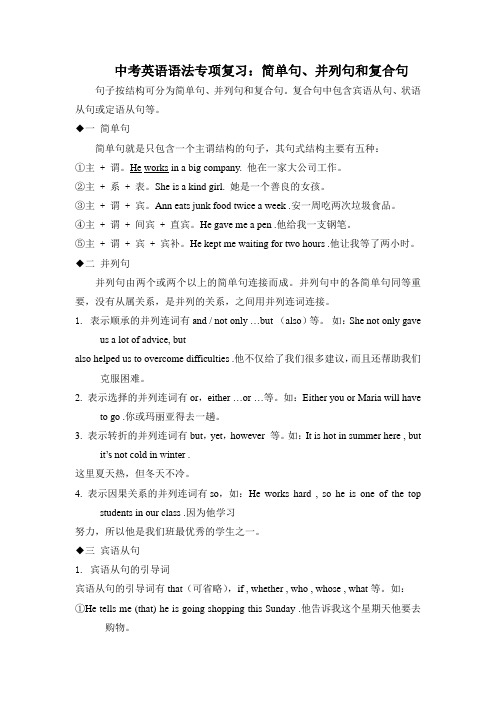
中考英语语法专项复习:简单句、并列句和复合句句子按结构可分为简单句、并列句和复合句。
复合句中包含宾语从句、状语从句或定语从句等。
◆一简单句简单句就是只包含一个主谓结构的句子,其句式结构主要有五种:①主 + 谓。
He works in a big company. 他在一家大公司工作。
②主 + 系 + 表。
She is a kind girl. 她是一个善良的女孩。
③主 + 谓 + 宾。
Ann eats junk food twice a week .安一周吃两次垃圾食品。
④主 + 谓 + 间宾 + 直宾。
He gave me a pen .他给我一支钢笔。
⑤主 + 谓 + 宾 + 宾补。
He kept me waiting for two hours .他让我等了两小时。
◆二并列句并列句由两个或两个以上的简单句连接而成。
并列句中的各简单句同等重要,没有从属关系,是并列的关系,之间用并列连词连接。
1. 表示顺承的并列连词有and / not only …but (also)等。
如:She not only gaveus a lot of advice, butalso helped us to overcome difficulties .他不仅给了我们很多建议,而且还帮助我们克服困难。
2. 表示选择的并列连词有or,either …or …等。
如:Either you or Maria will haveto go .你或玛丽亚得去一趟。
3. 表示转折的并列连词有but,yet,however 等。
如:It is hot in summer here , butit’s not cold in winter .这里夏天热,但冬天不冷。
4. 表示因果关系的并列连词有so,如:He works hard , so he is one of the topstudents in our class .因为他学习努力,所以他是我们班最优秀的学生之一。
中考英语简单句并列句复合句考点讲解及练习

简单句、并列句和复合句考点一简单句1.简单句只包含一个主谓结构.2.五种简单句:1)主+谓. He comes at last.2)主+系+表. She is a teacher.The soup tastes nice.3)主+谓+宾. They reached the village.4)主+谓+间宾+直宾. He gave me a pen.5)主+谓+宾+宾补. I find that book very useful.考点二并列句并列句:两个或两个以上的简单句,用连词连接起来;常用的连接词有:1.表示顺承关系的:and, not only…but also不仅….而且….等;She ______ gave us a lot of advice, _______ helped us to overcome difficulties.Linda tried to become an excellent teacher, _____ at last she succeeded.2.表示选择关系和否定条件的有or还是,否则Do you want to leave now ____ would you rather set off laterWear your coat, ____ you’ll catch a cold.3.表示转折关系的有but, yet等;He is young, but he works hard.虽然他年轻,但工作努力;4.表示因果关系的有for, so 等;My leg hurts so I go to see a doctor. 我的腿疼,因此我去看医生;考点三主从复合句:宾语从句1.宾语从句的引导词1引导陈述句用 that在口语和非正式文体中常常省略He tells me that he is going shopping this Sunday.2 引导一般疑问句用if或whether.She asked me if\ whether she could join us. whether…or not3 引导特殊疑问句,要用原来的特殊疑问词;She asked them what they were doing.2.宾语从句的语序:要用陈述句语序;I want to know when the train left.3. 宾语从句的时态1主句是一般现在时,一般将来时或祈使句,宾语从句可根据实际需要选用各种时态;He tells us that he has been able to look after himself.(2)主句是过去时态,宾语从句应使用过去时的相应时态;They said that they had already finished the work.(3)如果宾语从句叙述的是客观事实、真理、自然现象等,不管主句用什么时态,从句都用一般现在时;He said that light travels faster than sound.3. 练习1She asked me, “Will you go to the cinema tomorrow”改为含宾语从句的复合句She asked me______ I ______ go to the cinema the next day.2 How lovely the dog is Can you tell me _____A. where did you get itB. where will you get itC. where you got it3 --- Can you tell me _____ your parents at home--- I often wash clothes and sweep the floor.A.how will you helpB. how you helpC. how will you helpD. howdo you help4 When I was young, my grandfather told me that the sun ______ rise in the east.考点四状语从句一、状语从句在复合句中作状语,修饰主句中的动词、形容词、副词等;1.地点状语从句地点状语从句通常由 where 引导;Put all the things _____they were.A. whereB. whenC. whoseD. which2.时间状语从句主句用将来时,从句用一般现在时时间状语从句的引导词有when, before, after, until, as soon as, since, while, as 等She was cooking when someone knock at the door.What will you do after you finished your homework3.条件状语从句在条件状语从句中,常用的引导词有if, unless等;If it dosen’t rain, I” ll go fishing.They will have a picnic unless it rains next Sunday.4.原因状语从句原因状语从句常用的引导词有because, as, since既然等He didn’t come because he was ill.Since we are students, we should study hard.Because 和so 不能在一个句子中同时使用;5. 结果状语从句结果状语从句主要由so…that…, such…that…引导;It’s so hot that we want to go swimming.That’s such an interesting story that everybody likes it.So… that…与简单句之间的句型转换1)that后的句子是否定句,常用too…to进行转换;He is so young that he can’t go to school. he is too young to go to school.2)that后的句子是肯定句;常用enough to 进行转换;The shirt was so cheap that he bought it. the shirt was cheap enough for him to buy.6.目的状语从句目的状语从句常用的引导词有so that, in order that 等 in order to 简单句Please say it in a loud voice so that everyone can hear it.He works harder in order that he can go to a good college.7. 让步状语从句引导词有though, although, even if, even though尽管等;He often helps others though\ although he is not rich.They will stand by you even if you don’t succeed.Though, although与but 不能同时出现在一个句子中8.比较状语从句比较状语从句由than, as…as…, not as\so… as等引导;比较级He is more outgoing than I.He ran as fast as Mike.二、练习1. It’s quite common in Britain to say “thank you”to the drivers _____ people get off the bus.a. afterb. sincec. untild. when2. The art club is for members only. You can’t go in ____you are a member.a. unlessb. becausec. ifd. though3. Now many parents send their children to foreign countries, _____ they want them to get a better education.a. untilb. thoughc. because4. ---- What would some students like to do after finishing their education---- They would like to start to work_______ they needn’t depend on their parents completely.a. as soon asb. so thatc. befored. while考点五定语从句修饰某一名词或代词的从句叫定语从句;被定语从句修饰的词叫先行词,引导定语从句的词叫关系词关系代词和关系副词;1.关系代词的基本用法The man __________spoke at the meeting is from Hong Kong. 指人作主语The building ___________is being built will be used as a hospital.指物作主语I visited a scientist _______ name is known all over the world. 指人作定语2. 关系代词特殊用法1当关系代词在从句中作主语时,从句的谓语动词要与先行词保持一致;He is one of the boys who ______ like playing football.He is the only one of the boys who________ like playing football.2 通常以下四种情况关系代词只能用that而不能用which.1 先行词为all, much, something, everything, nothing, little, none, the one 等不定代词时2先行词被形容词最高级修饰时;3当先行词被the only, the very, the just等修饰时;4先行词中既有人又有物时;3. 关系副词的基本用法;1 when 在句中作状语,表示时间;2 where 在句中作状语,表示地点;.3 why 在句中作状语,表示原因;He remembers the day _______ he joined the League.This is the reason_______ he is late today.This is the place _______ Lu Xun was born.1. 2011泰安--- _______do you read English newspapers---I read China Daily every day.A. How longB. How soonC. How oftenD. How far2.2011抚州John had a short walk after lunch, _______A. did heB. didn't heC. had heD. hadn't he3.2011宁波--- _______do you have an Art Festival in your school---Once a year.A. How longB. How oftenC. How farD. How soon4.2011安徽省If you want to go to see the movie this evening, so _______I.A. doB. amC. willD. should5.2011长沙 _______tall the girl isA. HowB. HowaC. WhatD. What a6.2011长沙 _______ call me Mimi It's my cat's name.A. NotB. Didn'tC. Doesn'tD. Don't7.2011长沙They went to the park yesterday,_______A. don't theyB. didn't theyC. aren't theyD. can't they8.2011福州---Li Mei usually helps others, _______---Yes, she is kind-hearted.A. does sheB. is sheC. doesn't she9.2011眉山There _______an English party in our school tomorrow evening.A. haveB. will haveC. is going to haveD. will be10. 2011济南--- _______a year does your school have sports meetings---Twice a year.A. How oftenB. How soonC. How longD. How many times11. 2011泰州---I have changed my job.---_______.A. So do IB. So have IC. So I doD. So I have12. 2011济南Mike learns a lot about Internet. And _______.A. I don't, eitherB. so do IC. so am I am, too13. 2011眉山Jim never goes to the movies on Saturday, _______A. does JimB. doesn't JimC. doesn't heD. does he14. 2011玉州You've just finished your listening exam Please getyourself ready for the next part, _______A. shall weB. will youC. do youD. are you15. 2011眉山--- _______the weather like last Monday---It was sunny.A. How wasB. What'sC. What wasD. How is16. 2011潍坊_______great scientist Qian Xuesen isA. HowB. HowaC. WhatD. What a17. 2011眉山--- _______do you visit your grandparents---Once a month.A. How soonB. How longC. How muchD. How often18. 2011内江--- _______ do you speak English so well---Because I practice it with my partner every day.A. WhyB. WhenC. Who19. 2011泉州---We'll go to Qing Yuan Mountain tomorrow. Why _______join us---That's a good idea.A. notB. don'tC. can'tD. didn't20. 2011泉州There is little milk in the glass, _______A. is thereB. isn't thereC. isn't itD. does it21. 2011肇庆The students in Class Two played basketball against ClassOne yesterday,_____A. did theyB. didn't theyC. weren't they22. 2011宁波---What a new computer Can you tell me_______---Just the day before yesterday.A. how much you paid for itB. how much did you pay for itC. when you bought itD. when did you buy it23. 2011泰安---Tom wants to know if you will have a picnic tomorrow.---Yes. But if it _______, we'll play chess instead.A. will rainB. rainedC. is rainingD. rains24. 2011烟台---Do you know this dictionary belongs to---Let me see. Oh, it's_______.A. who does; mineB. who; meC. whose; mineD. who; mine25. 2011杭州Franklin told them all _______to be in Britain again.A. he was how happyB. how happy he wasC. how was he happyD. he was happy how26. 2011湖州---What kind of movies do you like---I like the movies_______ are about Chinese history.A. whoB. whomC. whoseD. that27. 2011丽水---Do you know _______---Sorry, I don't have a watch.A. whose watch this isB. whose watch is thisC. what time it isD. what time is it28. 2011重庆The woman asked the policeman where _______.A. the post office isB. the post office wasC. is the post officeD. was the post office29. 2011泰安---Can you guess_______ the new schoolbag yesterday.----Sorry, I've no idea.A. how much did he pay forB. how much he spentC how much he paid for D. how much did he spend30. 2011杭州Who is the man_______ is reading a book over thereA. thatB. whichC. whoseD. what31. 2011湖州---Do you know_______---Next Sunday.A. what they will doB. where they will doC. when they will come hereD. who they will meet32. 2011长沙---Can you tell me why_______---Because I want to help the people there.A. do you go to Tibet西藏B. did you go to TibetC are you going to Tibet D. you are going to Tibet33. 2011浙江省---Linda, could you tell me _______---He is an actor.A. what he doesB. what does he doC where he works D. where does he work34. 2011福州---Could you tell me _______---Sure. The day after tomorrow.A. when will you leave for the U.S.A.B. when Mr. Lee will comeC when your father returned35. 2011济南He asked me_______.A. who did kick the first goal in the World CupB. when was the A. PEC meeting heldC when China became a member of the WTOD. where will the 2008 Olympics be held36. 2011玉州Jane is one of the students in the class _______ have everbeen to China.A. whoB. whoseC. whichD. whom37. 2011济宁Can you tell me _______after this examA. what you didB. what did you doC. what will you doD. what you will do38. 2011苏州---Can you tell me how many colours _______ in a rainbow---SevenA. there areB. are thereC. they areD. are they39. 2011潍坊I can't understand _______Apple's iPad 2.A. why are they so mad aboutB. why they are so mad aboutC. how are they so mad aboutD. how they are so mad a。
中考英语总复习 简单句(陈述句、感叹句、疑问句及祈使句)
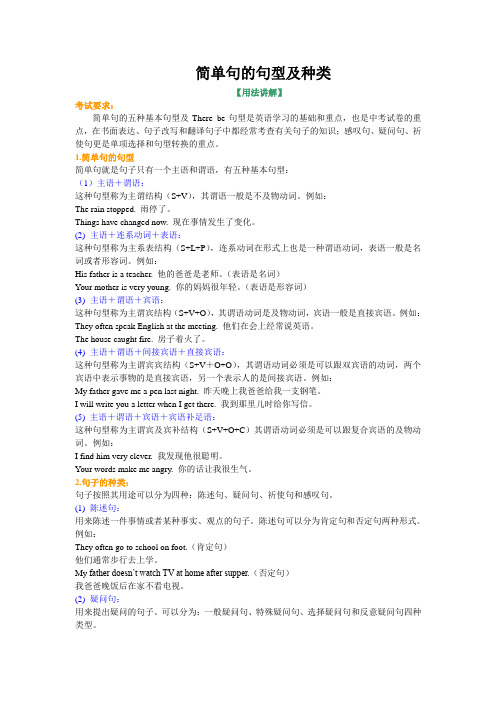
简单句的句型及种类【用法讲解】考试要求:简单句的五种基本句型及There be句型是英语学习的基础和重点,也是中考试卷的重点,在书面表达、句子改写和翻译句子中都经常考查有关句子的知识;感叹句、疑问句、祈使句更是单项选择和句型转换的重点。
1.简单句的句型简单句就是句子只有一个主语和谓语,有五种基本句型:(1)主语+谓语:这种句型称为主谓结构(S+V),其谓语一般是不及物动词。
例如:The rain stopped. 雨停了。
Things have changed now. 现在事情发生了变化。
(2)主语+连系动词+表语:这种句型称为主系表结构(S+L+P),连系动词在形式上也是一种谓语动词,表语一般是名词或者形容词。
例如:His father is a teacher. 他的爸爸是老师。
(表语是名词)Your mother is very young. 你的妈妈很年轻。
(表语是形容词)(3)主语+谓语+宾语:这种句型称为主谓宾结构(S+V+O),其谓语动词是及物动词,宾语一般是直接宾语。
例如:They often speak English at the meeting. 他们在会上经常说英语。
The house caught fire. 房子着火了。
(4)主语+谓语+间接宾语+直接宾语:这种句型称为主谓宾宾结构(S+V+O+O),其谓语动词必须是可以跟双宾语的动词,两个宾语中表示事物的是直接宾语,另一个表示人的是间接宾语。
例如:My father gave me a pen last night. 昨天晚上我爸爸给我一支钢笔。
I will write you a letter when I get there. 我到那里儿时给你写信。
(5) 主语+谓语+宾语+宾语补足语:这种句型称为主谓宾及宾补结构(S+V+O+C)其谓语动词必须是可以跟复合宾语的及物动词。
例如:I find him very clever. 我发现他很聪明。
中考英语复习之简单句
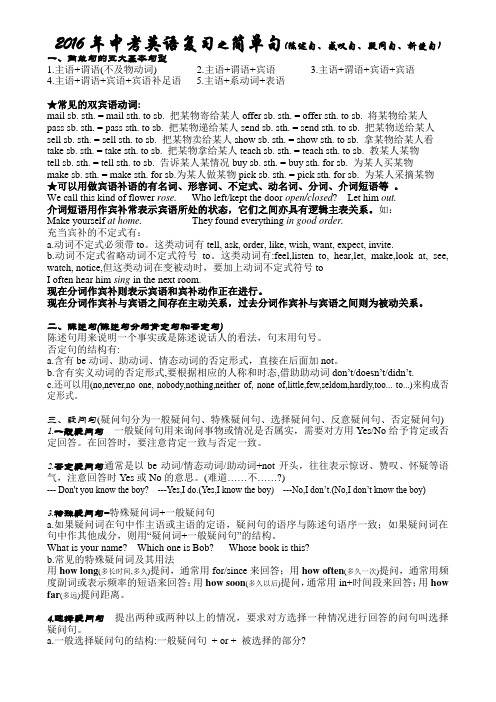
2016年中考英语复习之简单句(陈述句、感叹句、疑问句、祈使句)一、简单句的五大基本句型1.主语+谓语(不及物动词)2.主语+谓语+宾语3.主语+谓语+宾语+宾语4.主语+谓语+宾语+宾语补足语5.主语+系动词+表语★常见的双宾语动词:mail sb. sth. = mail sth. to sb. 把某物寄给某人offer sb. sth. = offer sth. to sb. 将某物给某人pass sb. sth. = pass sth. to sb. 把某物递给某人send sb. sth. = send sth. to sb. 把某物送给某人sell sb. sth. = sell sth. to sb. 把某物卖给某人show sb. sth. = show sth. to sb. 拿某物给某人看take sb. sth. = take sth. to sb. 把某物拿给某人teach sb. sth. = teach sth. to sb. 教某人某物tell sb. sth. = tell sth. to sb. 告诉某人某情况buy sb. sth. = buy sth. for sb. 为某人买某物make sb. sth. = make sth. for sb.为某人做某物pick sb. sth. = pick sth. for sb. 为某人采摘某物★可以用做宾语补语的有名词、形容词、不定式、动名词、分词、介词短语等。
We call this kind of flower rose.Who left/kept the door open/closed? Let him out.介词短语用作宾补常表示宾语所处的状态,它们之间亦具有逻辑主表关系。
如:Make yourself at home.They found everything in good order.充当宾补的不定式有:a.动词不定式必须带to。
初中英语语法总结(简单句)

初中英语语法总结一、简单句1、简单句的特点:简单句通常只由一个主语(或并列主语)和一个谓语(或并列谓语)构成。
2、简单句的种类:简单句一般分为陈述句、疑问句、感叹句和祈使句四种。
3、陈述句:用来说明一个事实的句子叫陈述句。
它有肯定式和否定式两种形式。
▲陈述句的肯定式:He is a middle school student.(他是个中学生)/ I have a hammer in my hand.(我手上有把锤子)/ She teaches us geography.(她教我们地理)/ The new play was good enough and everybody enjoyed it.(新的话剧非常好大家都喜欢)▲陈述句的否定式:1)谓语动词如果是to be 、助动词、情态动词时,在它们的后面加“not”。
如:My brotheris not a teacher.(我的弟弟不是教师)/ He does not have a cousin.(他没有堂兄弟)/ I will not go there tomorrow.(明天我不去那儿)/ My mother is not cooking a meal inthe kitchen.(我母亲现在不在厨房里做饭)/ You must not make such mistakes again.(你不该再犯类似错误了)/ We haven’t discussed the question yet(我们还没有讨论那个问题呢).2)谓语动词如果没有上述词语而是其他动词时,须在它的前面加do not(don’t).如:Idon’t know anything about it.(此事我一无所知) / Li Ming does not feed pigs in thecountryside.(李明不在农村养猪)/ We didn’t expect to meet her right here.(我们没指望着在这里见到她)/ We didn’t have a meeting yesterday afternoon.(昨天下午我们没有开会)3)如果“have”作“有”讲,也可以在它后面加not构成否定式,其形式与have got的否定式相同。
中考英语语法语法专项之简单句

五、There be 句型(存现句)和主谓一致
3. There be 句型与have的区别
There be 句型表示“存在”,强调“某地或某时有某物或某人”,不表示所属关系。 have 表示所属关系,强调“某人或某物拥有...”。 There is a pen on my desk. 我的书桌上有一支钢笔。(钢笔在我书桌上,但不一定是我的) I have a pen. 我有一支钢笔。(钢笔不管在哪儿,它都是我的)
六、主谓一致
3. 就近一致
就近一致即谓语动词与离它最近的主语部分保持一致。 There be/Here be 句型 either...or..., neither...nor..., or not only... but also..., not... but...
一、简单句的基本句型
2. 简单句的五种基本句型:
主语+系动词+表语 (S+V+P) 主语+不及物动词 (S+V) 主语+及物动词+宾语 (S+V+O) 主语+及物动词+间接宾语+直接宾语 (S+V+IO+DO) 主语+及物动词+宾语+宾语补足语 (S+V+O+OC)
She is beautiful. Mike works hard. I teach English. Maria sent me a present.
二、疑问句
1. 疑问句的分类
句型 一般疑问句
特殊疑问句 选择疑问句 反意疑问句
结构 Be+主语+其他? 情态动词+主语+动词原形+其他? 助动词+主语+动词原形+其他? 助动词+主语+过去分词+其他? 特殊疑问句+一般疑问句? 一般疑问句,...+or+另一备选对象? 特殊疑问句,...+or+另一备选对象? 陈述句/祈使句+附加问句
透析中考英语语法简单句考点

0简单句。
【语法回顾】简单句通常只由一个主语(或并列主语)和一个谓语(或并列谓语)构成。
简单句一般分为陈述句、疑问句、感叹句和祈使句四种。
一、陈述句用以肯定或否定一件事情或看法的叙述性句子叫陈述句。
句末用句号,读时用降调。
1、陈述句肯定式的正常语序是主语位于谓语前。
例如:We'll meet again tomorrow .我们明天再见面。
Last week we started our trip across this country.上星期我们开始了横跨这个国家的旅行。
2、陈述句否定式的结构(1)在连系动词be,实义动词have,助动词或情态动词后加not,never......等否定词构成否定式。
例如:We mustn't waste any more time.我们决不能在浪费时间了。
I've never been so afraid in all my life.在我一生中,我从来没有这么害怕过。
当谓语动词是have“有”时,其否定式可以有两种:Students usually have not their P.E. lessons on Monday.学生们通常在星期一没有体育课。
Students don't usually have not their P.E. lessons on Monday.(2)在行为动词前加do (does,did)not(句中的行为动词应用原形)构成否定式。
例如:I didn't find Chinese easy at first. 起初,我发现中文不容易。
Sorry, I don't know much about him.对不起,我对他不大了解。
He doesn't like American movies very much.他很不喜欢美国电影。
(3)句中若有no,none,little,not,nobody,nothing,neither,nor,never,hardly,scarcely 等否定意义的词,可构成陈述句的否定式,同时不能再用not。
中考中考英语专题-简单句(包含感叹句、祈使句)
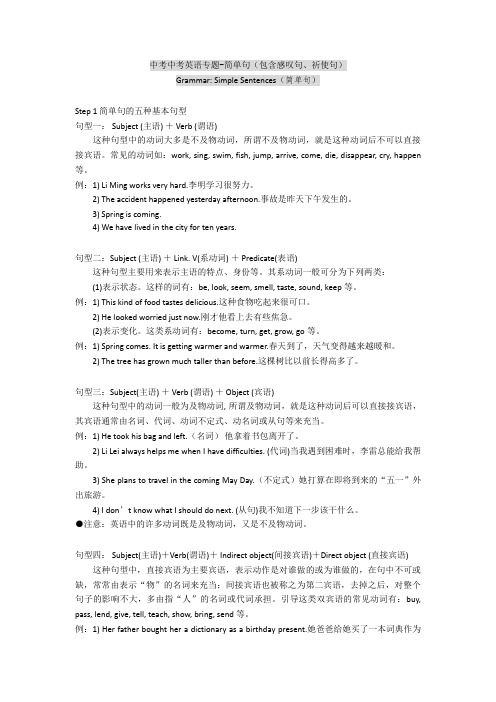
中考中考英语专题-简单句(包含感叹句、祈使句)Grammar: Simple Sentences(简单句)Step 1 简单句的五种基本句型句型一: Subject (主语) + Verb (谓语)这种句型中的动词大多是不及物动词,所谓不及物动词,就是这种动词后不可以直接接宾语。
常见的动词如:work, sing, swim, fish, jump, arrive, come, die, disappear, cry, happen 等。
例:1) Li Ming works very hard.李明学习很努力。
2) The accident happened yesterday afternoon.事故是昨天下午发生的。
3) Spring is coming.4) We have lived in the city for ten years.句型二:Subject (主语) + Link. V(系动词) + Predicate(表语)这种句型主要用来表示主语的特点、身份等。
其系动词一般可分为下列两类:(1)表示状态。
这样的词有:be, look, seem, smell, taste, sound, keep等。
例:1) This kind of food tastes delicious.这种食物吃起来很可口。
2) He looked worried just now.刚才他看上去有些焦急。
(2)表示变化。
这类系动词有:become, turn, get, grow, go等。
例:1) Spring comes. It is getting warmer and warmer.春天到了,天气变得越来越暖和。
2) The tree has grown much taller than before.这棵树比以前长得高多了。
句型三:Subject(主语) + Verb (谓语) + Object (宾语)这种句型中的动词一般为及物动词, 所谓及物动词,就是这种动词后可以直接接宾语,其宾语通常由名词、代词、动词不定式、动名词或从句等来充当。
2024年中考英语简单句
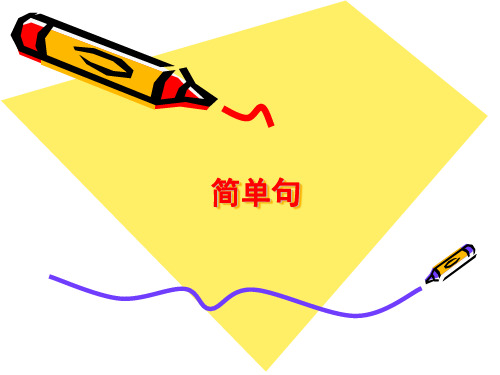
computer. =My father bought a computer
for me. 我爸爸给我买了一台电脑。 I passed him the water.=I passed
the water to him. 我把水递给他。
5. 主语+谓语+宾语+宾语补 足语 [S+V+O+C]
How beautiful a girl she is! 她是个多么漂亮的姑娘啊!
How time flies! 光阴似箭!
【注意】 两种句式可以互换。 如:What delicious cakes these are! =How delicious these cakes are! 这些蛋糕真美味呀!
=There is going to be an English evening next week. 下周将有一场英 语晚会。
There stand many trees in front of our school. 我们学校前面有很多树。
【注意】 There be 句型中的 be 动词要和其后出现的名词在数上保 持一致,当主语是两个或两个以上 的名词时,be 动词要与离它最近的 那个名词一致,即符合“就近原 则”。
【注意】 以 Let 开头的祈使句 构成反义疑问句时,Let's...,反义问 句用 shall we;Let us...,反义问句 用 will you。
如:Let's watch the film together, shall we? 我们一起看电影吧,可以 吗?
Let us help the poor, will you? 咱 们一起帮助那些穷人吧,好吗?
—You will never forget him, will you? 你永远不会忘记他,对吧?
- 1、下载文档前请自行甄别文档内容的完整性,平台不提供额外的编辑、内容补充、找答案等附加服务。
- 2、"仅部分预览"的文档,不可在线预览部分如存在完整性等问题,可反馈申请退款(可完整预览的文档不适用该条件!)。
- 3、如文档侵犯您的权益,请联系客服反馈,我们会尽快为您处理(人工客服工作时间:9:00-18:30)。
中考英语知识点复习专题十四简单句
易错清单
一、陈述句的否定结构
1. 含有have的否定句
(1) have当“拥有,所有”讲时,其否定形式有两种。
如:
I have an e-dictionary. 我有一个电子词典。
可改为:I don't have an e-dictionary. (√)
I have not an e-dictionary. (√)
(2) have作“吃、喝、玩、度过”讲时,其否定形式借助于助动词do。
如:
I had milk for breakfast this morning. (变否定句) →I didn't have milk for breakfast this morning.
(3) have为助动词时,其否定形式为haven't。
如:
I have visited Diaoyu Island. (变否定句) →I haven't visited Diaoyu Island.
2. 注意以下几种情况:
(1)含有all, both, each, every, both...and...等的肯定句加not变为否定句后,只表示部分否定;若表示全部否定,则需分别用no, no one, nobody, none, neither, neither...nor...等词替换上述词。
如:
Both Mary and Joan are students
→Neither Mary nor Joan is a student.
(2)含有already (已经),too (也)的肯定句加not变为否定句时,要分别把already和too改为yet和either。
如:
He has already seen the movie. (变为否定句) →He hasn't seen the movie yet.
I want to go for a picnic, too. (变否定句) →I don't want to go for a picnic,either.
(3)含有almost, many, much, often等词的肯定句可直接用never (hardly),few, little, seldom 变为否定句,而不用加not。
如:
He always stays up late in the evening. (变为否定句) →He never (hardly) stays up late in the evening.
There is much food in the fridge. (变为否定句)→There is little food in the fridge.
3. 当主句的谓语动词是think, believe, suppose等时,若要否定宾语从句,应注意否定转移现象。
如:
I think you are right. 我认为你是对的。
I don't think you are right. 我认为你不对。
二、一般疑问句的回答
一般情况下,含有情态动词的一般疑问句,回答时应用与问句相同的词,但有时也用其他情态动词来回答。
用情态动词may提问时,否定回答用mustn't, can't, may not。
如:
—May I smoke here?——我可以在这儿吸烟吗?
—Yes, you may. ——是的,可以。
—No, you mustn't. ——不,绝对不可以。
—No, you can't. ——不,不可以。
提分策略
简单句的基本句型各有特色。
例如:反意疑问句由“陈述句+简单问句”构成;感叹句由what或how引导;祈使句由动词原形开头等。
考生要熟记简单句的各种句型,积累一些经典句型。
根据句型特点解答有关试题。
【例】(2014·福建福州·32)—foggy day!
—Something must be done to solve the haze problem.
A. How
B. What
C. What a
【解析】本题考查感叹句的用法。
因为这里是形容词foggy后面加单数名词day, 用what来引导。
所以选C。
【答案】 C
2. 通过语境判断答案解题过程中,考生要正确理解句意,根据语境,将答案代入题干,然后做出正确选择。
【例】(2014·江苏苏州·2)—do you go to the sports club?
—At least once a week.
A. How long
B. How often
C. How much
D. How far
【解析】本题考查疑问词的用法。
根据下句的回答“至少每周一次”,所以可知上句
问的是动作发生的频率,所以上句的疑问词是how often。
【答案】 B
专项训练
1. (2014·内蒙古赤峰·37)—Have you heard of Zhang Lili? She was seriously hurt in an accident in order to save one of her students.
—good teacher!
A. How
B. What
C. What a
D. What an
2. (2014·江苏常州·28)—Millie hardly did the housework after she bought the robot, ? —. She could relax and have time for her hobbies.
A. did she; Yes
B. didn't she; No
C. didn't she; Yes
D. did she; No
3. (2014·山东德州·20)He's still not understood by his close friend although he has said sorry to him, ?
A. hasn't he
B. has he
C. isn't he
D. is he
4. (2013·四川成都)—do you surf the Internet, Maria?
—Twice a week.
A. How long
B. How often
C. How soon
5. (2013·四川绵阳)—Don't smoke in the reading room, ?
—I'm sorry. I won't do it again.
A. will you
B. shall we
C. do you
6. (2013·湖南长沙)—do you think of the film?
—Very interesting.
A. What
B. Who
C. How
7. (2013·天津)—nice dress it is!
—Thank you!
A. What a
B. What
C. How
D. How a
8. (2013·河北)—is the dictionary?
—It's $22. 95.
A. How old
B. How long
C. How thick
D. How much
参考答案与解析
1. C解析:考查感叹句的用法。
句中的名词是单数形式,感叹句应该用what a 来引导。
故选C。
2. A解析:考查反意疑问句的用法。
疑问句的陈述部分含否定意义,疑问部分应该用肯定结构,所以排除B、C两项。
由应答句后面一句判断,该疑问句应该作肯定回答。
故选A。
3. D解析:考查反意疑问句的用法。
该句是让步状语从句,主句是一般现在时态的被动语态,反意问句应该与主句一致,故选D。
4. B解析:考查疑问副词的用法。
how long 询问(延续)多长时间,回答用for...或since...引导的时间状语;how often 多久一次,询问动作的频率,多长时间;how soon 询问还要多久才……,一般用于将来时,回答用in + 一段时间。
5. A解析:考查反意疑问句。
句子的陈述部分是祈使句,祈使句的反意疑问句的疑问部分是will you? 故选A。
6. A解析:考查特殊疑问词的用法。
根据对话中的答语“很有趣”可知,提问的是对事物的看法,用句型“What do you think of...?”。
故选A。
7. A解析:考查感叹句的用法。
nice dress为可数名词短语,前用what,可数名词短语前面要用冠词a/an, 故选A。
8. D解析: 考查疑问副词的用法。
how old 询问多大岁数,how long询问多长时间,how thick 询问多厚,how much询问多少钱。
此题的答语是价钱,故选D。
